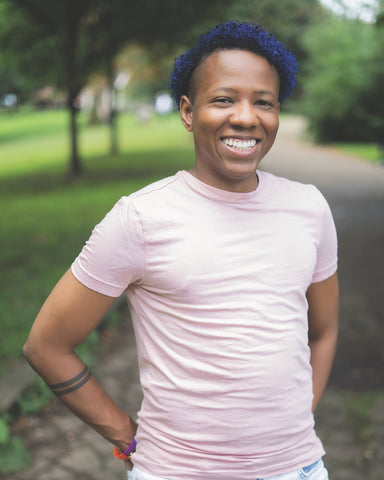"More Realness" in our literature with Kacen Callender
National Book Award winner Kacen Callender reflects on why it is so important to build inclusive literary curriculum for children and teens. Their latest YA book, FELIX EVER AFTER, is on sale now.

Hello, teachers, librarians, and booksellers!
It’s Kacen Callender, and I’m excited to share with you why I think you should “shake up your shelves.” I’ve had the honor of meeting with young readers in classrooms, libraries, GSAs, and more—and one of my favorite ways to end an event is to ask the young readers what it is that they’re looking for from books. Overwhelmingly, across the board, the #1 response has always been: “we want more realness.”
We’re entering a new era—some will argue we’ve already been there for some time now. In this era, we can more easily see how white supremacy has not only built the world we live in now, but how its tendrils have managed to squirm its way into curriculums and mindsets on what is “classic”—what is considered canon, what it is that a child must read in order to be considered educated, which texts and stories and voices are considered more important. When I was young, I never questioned why Shakespeare and Voltaire and other dead white men were crammed into my brain. I never thought about how this forcing of dead, white language also meant forcing me into a system that automatically views these voices as the only necessary ones, the only important ones, that the voices of my ancestors, and my people now, did not matter; this strange constant assimilation and almost cultural death we place ourselves and our children into, forcing us to think that these texts are classics when so many other texts, from our own voices and cultures, have historically been burned and buried so that our shelves today would only have the voices of the white cultures that killed them.
“We want more realness.” What does Shakespeare have to do with this government, today, that is systemically killing Black people at higher rates, this world that allows Black, trans women to be brutally murdered? Oh, yes, I’m sure we can find some connective theme to a story or sonnet, but is finding that theme going to save another Black, trans woman’s life, or stop another police officer from killing another unarmed Black person? Sure, maybe some other “classic” text could reference tyrannical governments, fighting for freedom—but wouldn’t it be nicer, maybe, to read books that discuss the tyranny we’re living in today, and what steps we should each be taking to find our own freedoms? Wouldn’t it be nice, perhaps, to read a book that reflects our current struggles along with our triumphs, our joys? Is continuing to reference texts of dead white men getting in the way of our own growth, the freeing of our minds into seeing the importance of texts that readers will be able to connect to because they actually see themselves for once?
It’s time to shake up all of our shelves—in the classrooms, libraries, bookstores, and at home. It’s time to pick up texts by people who have been historically marginalized, to learn about the underprivileged, underrepresented people around us that the current administration has worked so hard to keep apart and in many ways kill, to learn empathy for voices and to see our own gloriously reflected. This is only one in many steps to a better world.
“We want more realness,” I remember one teen saying. Another laughingly added, “Please, no more dead white men. We don’t care!” I really can’t blame them.


Kacen Callender is originally from Saint Thomas, in the US Virgin Islands. Kacen has a BA from Sarah Lawrence College and an MFA from the New School’s writing for children program. They are also the author of the young adult novel This Is Kind of an Epic Love Story and the middle grade novels King and the Dragonflies and Hurricane Child, winner of the Stonewall Book Award and Lambda Literary Award. They can be found online at www.kacencallender.com.



